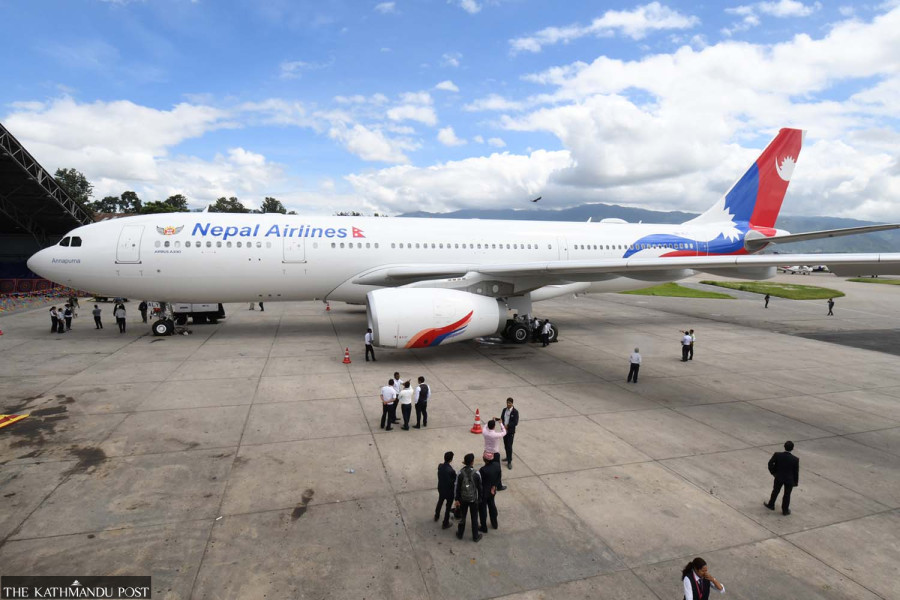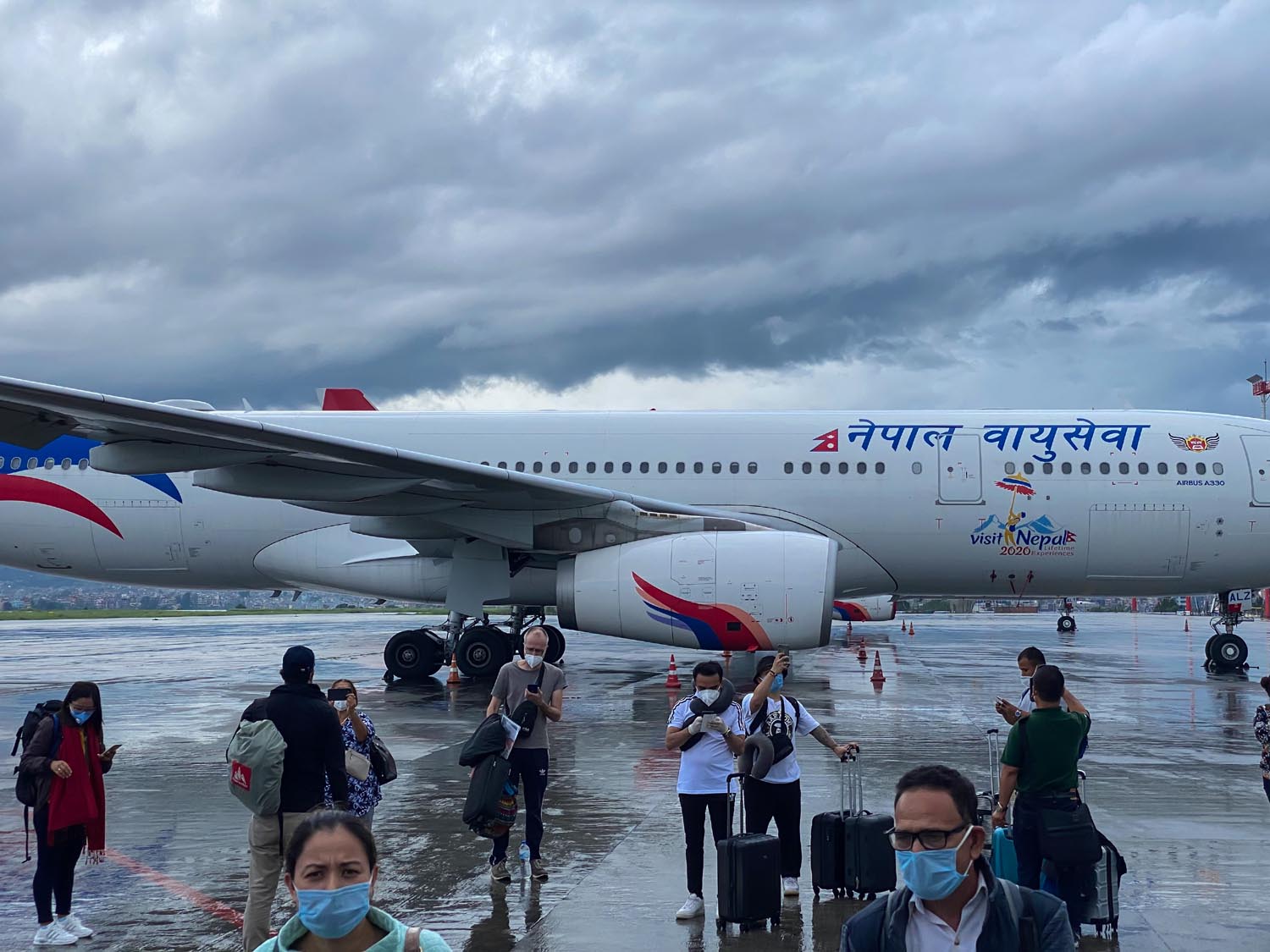Money
How the shady Airbus A330 jets deal was orchestrated
The US-based AAR obtained business by bribing Nepali officials. It has agreed to pay more than $55 million to resolve probes over foreign corruption links.
Sangam Prasain
Then managing director of Nepal Airlines Sugat Ratna Kansakar had sent a draft of the request for proposal (RFP) for procuring two Airbus A330s to AAR Corp, the US-based global aerospace company, well in advance, to tweak conditions in favour of the AAR.
Then, the clauses in the draft were cunningly adjusted and sent back to Nepal Airlines, according to the statement and formal document submitted to the US Securities and Exchange Commission (SEC) by AAR.
Such manipulation is a criminal offence under Nepal’s public procurement law, but the criminal aspect has been overlooked throughout Nepal's investigation into the Airbus scam.
From 2015 to 2018, the shadowy deal to pocket multi-million dollar bribes was orchestrated.
The shady process followed a long sequence: The RFP draft was prepared. It was then sent to AAR Corp to manipulate its clauses to win the bid. The document was returned to Nepal Airlines, and the RFP was issued. After that, the supply contract was signed, following which the plane supplier was changed.
After the change of supplier, many shady intermediary companies were opened to distribute the bribes.
The SEC made the document public on December 19.
In 2015, Nepal Airlines received a nod from its board to buy two wide-body jets from Airbus, the European aviation giant, after receiving two narrow bodies of the Airbus A320 aircraft.
The decision followed its management’s recommendation to switch to Airbus from Boeing as pursuing a one-family aircraft strategy would reduce maintenance and crew training costs.
On September 26, 2016, the national flag carrier invited sealed requests for proposal (RFP) from aircraft manufacturing companies, airlines, aircraft leasing companies and bankers to purchase two A330-200 jets. The $209.6-million plane purchase deal was the largest in Nepal’s aviation history.
In 2015, Deepak Sharma, 46, a Nepali-born British citizen, was hired as president of the International Supply Chain for an AAR subsidiary. At the time, Sharma suggested he could help secure the Nepal Airlines deal. Upon arriving at AAR, Sharma pursued the opportunity as the lead employee responsible for winning the Nepal Airlines contract, reporting directly to an AAR executive.
Sharma, the president of the AAR subsidiary, had been in charge from November 2015 until his suspension in April 2019— when Kansakar orchestrated the plan.
In March 2016, Sharma secured and shared internally at AAR an unpublished draft of the RFP for AAR executives to “comment on” and “change any terms to suit AAR.”
As a result, Sharma and others at AAR proposed changes to the draft RFP to benefit AAR in the bidding process.
According to the document, a few months later, Sharma “emailed the Nepal Airlines’ Managing Director adding specifications to the RFP, and then forwarded this email internally,” writing that the “way this RFP is going no one else will qualify to bid except AAR.”
The bid documents said the minimum age of the proposed aircraft could not be more than 1,000 flight hours, and the date of manufacture should not be before January 2014.
The intent was to keep the manufacturer Airbus out of the race as it could not deliver used planes and other bidders could not meet the specifications outlined in the bid document.
On September 26, 2016, the RFP was officially published. Upon publication, Sharma reported in an internal email that the RFP was “designed for us.”
When the final deadline ended on November 10, 2016, eleven international firms submitted bids to supply two long-range wide-body passenger jets to Nepal Airlines.
The suppliers were Rolls-Royce, KL AeroParts, Aircraft Investment Group, Crown Commercial Services, Synergy Aerospace, ST Aerospace, Le Group Delta, AAR Corporation, Surya Air Support, KJT Investment & One World Closeouts and Ron Motta Associates Aircraft Sales & Parts. Rolls-Royce had applied to supply the aircraft engine.
Sharma’s internal communications to AAR personnel suggested that Nepal Airlines request for proposal (“RFP”) would be drafted to favour AAR.
For example, on November 22, 2015, Sharma sent an internal email conveying that he had a “good meeting” with the “CEO of [Nepal] airlines” and that the RFP for the transaction would be drafted in favour of the AAR.
In a follow-up December internal email, Sharma forwarded the email correspondence between himself and Nepal Airlines’ Managing Director Kansakar, adding that the Managing Director was “100 percent relying on us to bid and win this aircraft sales” contract.
Soon after the RFP was published, Sharma discussed internally the need to engage third-party Agents [a Hong Kong corporation, controlled by a German corporation and a Portuguese charter airline, and purportedly involved in the telecom business] as an agent on the Nepal Airlines transaction.
In doing so, Sharma noted that he would “pull all political strings in Nepal” and that setting up a foreign representative agreement (FRA) with Hong Kong corporation would help “lock… in” the Nepal Airlines deal.
The Hong Kong corporation, purportedly a telecom business, was engaged by an AAR subsidiary despite red flags raised during due diligence.
AAR's due diligence flagged that the Hong Kong corporation lacked any aviation industry experience and had limited and vague descriptions of the services it would provide.
Two customer references provided by the Hong Kong corporation involve sales of cell phones and electronics.
As a part of the scheme, the AAR subsidiary retained the Hong Kong corporation, whose role was to bribe officials who had control over the Nepal Airlines contract.
AAR terminated its relationship with the Hong Kong corporation before the transaction’s closing, resulting in Sharma arranging to have the German corporation pay the Hong Kong corporation and its successor entity—another Dubai-based entity incorporated in the UAE—a success fee for winning the Nepal Airlines contract.
On November 1, 2016, the Hong Kong corporation was officially engaged under the Foreign Representative Agreement (FRA). Under the FRA, the corporation would get a commission payment of 7 percent of the final sales price of the two aircraft, and the commission payment was estimated to be between $9.6 million and $14.6 million.
On November 8, 2016, the AAR subsidiary formed a consortium through a framework agreement with the German corporation and the Portuguese charter airline (collectively the “AAR Consortium”) to submit a bid on the Nepal Airlines RFP.
Under the initial structure, AAR would provide the aircraft, the German corporation would offer financing, and the Portuguese charter airline would provide services, spare parts, and tooling.
The German corporation would use a Special Purpose Vehicle to buy the two A330 aircraft from Airbus, and the Special Purpose Vehicle would then sell the aircraft to AAR, which in turn would sell the aircraft to Nepal Airlines.
AAR estimated it would make between $8 million and $12 million from that transaction structure.
On November 9, 2016, the AAR Consortium submitted its bid in response to the RFP. In the cover letter for the bid, Sharma addressed Nepal Airlines Managing Director Kansakar. The next day, Sharma texted an AAR executive, “We got the Nepal deal.”
On December 1, 2016, AAR executives learned from Sharma that the money going to the German corporation would be used to “donate to Nepal's political parties” as part of the Nepal Airlines deal.
On December 4, 2016, AAR received an anonymous email alleging bribery in the Nepal Airlines deal.
After learning from Sharma that the German corporation would be making these payments, AAR terminated the German corporation on December 9, 2016.
On January 16, 2017, Nepal Airlines notified AAR that its board had approved the AAR Consortium’s bid.
On January 27, 2017, Nepal Airlines signed a Memorandum of Understanding (MoU) with AAR Corp to buy two Airbus A330-200 long-range jets. The airline then planned to pay AAR Corp a $1 million “commitment fee” within two to three days to formally confirm the order.
Kansakar told the Post at that time that AAR, the American aviation support company, quoted an “offer price” of $104.8 million for each jet. “However, the ‘contract price’ may differ slightly in the purchase agreement.”

When AAR terminated the German corporation on December 9, 2016, the delivery date and the supplier were abruptly changed.
Subsequently, the national flag carrier told the Nepali media its fleet expansion plan would be delayed by three months.
As per the revised schedule, Nepal Airlines was to receive the first aircraft by January 2018.
According to the US Securities and Exchange Commission document, the initial supply plan was restructured so that the Special Purpose Vehicle would buy the two A330s from Airbus. Rather than selling them to AAR, the vehicle would sell the aircraft directly to Nepal Airlines.
To negotiate the transaction, AAR would receive a $6 million commission (rather than the originally planned $9.6-14.6 million).
As part of the termination of the FRA, the AAR subsidiary and the Hong Kong corporation executed a termination of the German corporation, and there was a separate fee agreement that provided the Hong Kong corporation with $250,000 as “full payment” for its time and costs associated with its efforts relating to the sale of [the] aircraft”.
Sharma subsequently put in place a May 2017 agreement between the Hong Kong corporation and the German corporation under which the German corporation would pay its Hong Kong counterpart a commission of $4 million per aircraft ($8 million total).
The agreement was backdated to October 7, 2016 to make it look like it was in place when the AAR Consortium placed its bid.
A subsequent July 2017 agreement replaced the German corporation with the Special Purpose Vehicle, making it responsible for paying the relevant sales commission to the Hong Kong corporation.
However, when the Nepal Airlines transaction closed, the terminated German corporation’s payments (through the Special Purpose Vehicle) to the Hong Kong corporation were blocked due to the “Know Your Customer” rules of the Hong Kong corporation’s bank.
This resulted in Sharma working with a Nepali national to set up a new Dubai-based company to receive payments from the German corporation.
The Dubai-based entity was incorporated on October 22, 2017 with one of its two shareholders being the son of a Nepali national.
In 2018, AAR paid the Hong Kong corporation $250,000 in commission via a wire transfer through at least one US correspondent bank, and the German corporation and Dubai-based entity were paid $2.6 million.
While the payment to the Hong Kong corporation was part of the bribery scheme and the AAR subsidiary lacked documentary evidence reflecting any legitimate services provided by the corporation, the AAR subsidiary recorded $250,000 as a legitimate commission expense.
AAR failed to devise and maintain internal accounting controls related to vendor management and accounts payable sufficient to provide reasonable assurances that AAR personnel were adhering to AAR’s Global Anti-Corruption Policy and its procedures on the retention of and payments to third-party agents.
In August 2024, in connection with the Nepal Airlines scam, Sharma pleaded guilty to a one-count criminal information filed in the US, charging him with conspiracy to violate the anti-bribery provisions of the Foreign Corrupt Practices Act (FCPA).
AAR agreed to pay more than $55 million to resolve investigations by the US Justice Department and the US Securities and Exchange Commission into violations of the Foreign Corrupt Practices Act, which prohibits bribe payments to foreign government officials.
According to the US Justice Department, AAR obtained profits of nearly $24 million as a result of the scheme.
Sharma pleaded guilty and agreed to forfeit around $130,000. His sentences are yet to be determined in the US court, so this case is ongoing.




 7.12°C Kathmandu
7.12°C Kathmandu














